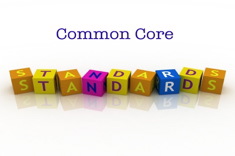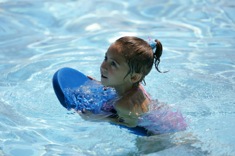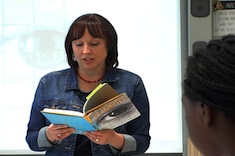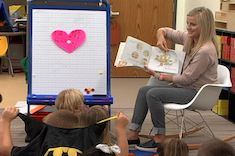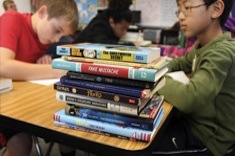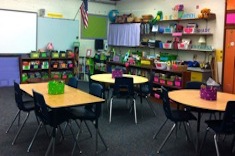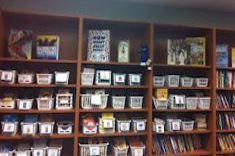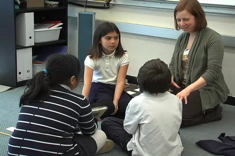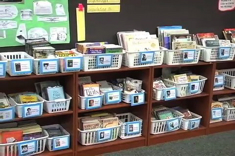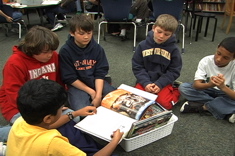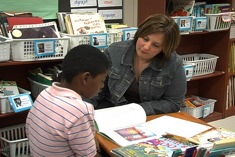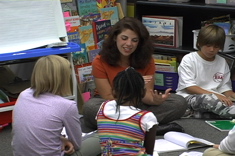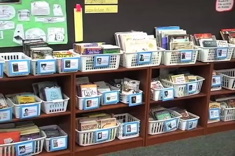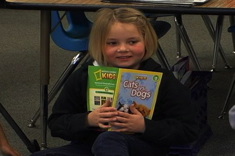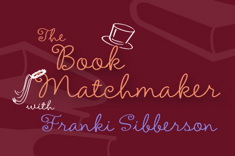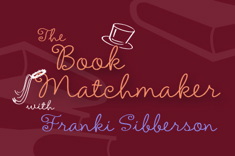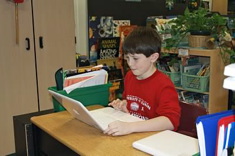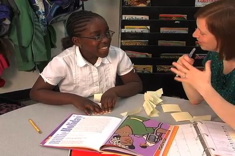3rd
Latest Content
Chronology in Nonfiction (Common Core Booklist)
Franki Sibberson's latest Common Core booklist includes texts to help students master chronology in nonfiction.
Appealing Book Displays for Boys
Are your book displays enticing to the boys in your classroom? Tony Keefer has suggestions for making classroom libraries more appealing.
Interactive Read Alouds to Support Struggling Readers
Shari Frost explains how interactive read alouds are the “kickboards” of reading instruction, especially for struggling readers. She explains how one teacher used them to support a struggling reader in 3rd grade.
When Are Students Ready for Writers’ Notebooks?
Second grade? Third grade? Aimee Buckner breaks down what behaviors to look for if you’re trying to determine when students are ready to move from draft pages or booklets to writers’ notebooks.
Field Experience: Writers’ Notebooks
Writers’ Notebooks are an important tool for writers. Ruth Ayres designed a field experience to showcase how elementary teachers use notebooks with young writers.
Field Experience: Social-Emotional Learning in Workshop
Compassion and understanding are as important to workshop instruction as strategies and routines. Ruth Ayres compiled a field experience to highlight the way understanding the social-emotional needs of students (and ourselves) allows for safe learning environments.
Field Experience: Craft Moves for Elementary Writers
This field experience invites us to consider a handful of craft moves to teach young writers in minilessons, conferences and share sessions.
Field Experience: Classroom Tours
Spend time noticing the details that reflect beliefs and influence instruction. Ruth Ayres set up room tours for a field experience focused on more than trendy spaces.
Field Experience: Small Group Reading Instruction
Small group reading instruction is an important part of elementary literacy. This field experience is a sampling of a variety of examples.
Field Experience: Picture Books and Older Students
The value of picture books with older students is often questioned. Ruth Ayres assembled this field experience to allow insight into the depth and power of picture books for older students.
Field Experience: General Workshop Routines
This field experience invites us to consider the routines of opening the day, workshop norms, meeting areas and transitions to make workshop run smoothly.
Engaging Boy Readers: Beginning with Teacher Behaviors
Tony Keefer considers some of those awkward early conferences with male readers in his classroom, and shares advice on how to get the year off to a comfortable start with minilesson and conferring suggestions.
Never Say Never: Motivation to Read from an Unlikely Source
Knock knock. Who’s there? A boy who loves sports and has no motivation for reading. Barclay Marcell discovers an unlikely source of engaging text for a child who just doesn’t enjoy books.
The Quest for the Perfect First Read Aloud of the Year
Franki Sibberson is on a quest to find the perfect first read aloud of the year, and the search helps her consider the goals and purpose of read alouds during the first days of school.
Rethinking My Nonfiction Library in Response to the Common Core
Franki Sibberson finds a new classroom, the Common Core, and tech considerations are changing the ways she organizes the nonfiction sections of her classroom library.
Book Club Meetings in 3rd Grade
Beth Lawson explains how she sets up book clubs in her 3rd grade classroom.
Grades 3&4 Room Tour
In this video tour, Franki Sibberson narrates a description of the grades 3&4 multiage classroom she shares with a colleague. The space is small, so Franki explains how storage areas are carefully arranged and seating is creatively designed to make the most of limited space.
Matching Students to Nonfiction Texts in Grades 3-6 (BOOKLIST)
In this booklist, Mary Lee Hahn offers creative categories for considering readers in new ways.
Next-Read Stack: Conferring for Independence
Franki Sibberson explains the value of "Next-Read Stack" conferences for fostering independence, and includes a video example.
Extreme Makeover: Revision Edition
Heather Rader finds short text and shared modeling of revision strategies are just the scaffolds students need to see the power of revision for improving writing.
The Five-Minute Solution: Mini-Groups after Minilessons to Maximize Conferring Time
Aimee’ Buckner’s mini-groups are an easy and simple way to differentiate instruction in workshops, and save time when conferring.
If You Like Junie B. Jones, You Might Like . . .
What young learner doesn’t love Junie B. Jones? Franki Sibberson shares great texts to recommend for readers who adore Junie and might be looking for similar characters and plots.
Synthesis in Reading and the Reading Notebook
Beth Lawson helps one of her 3rd grade students write in response to a complex text he is reading, talking through how the writing might help him synthesize the plot of the story.
Previewing Nonfiction
Teachers are adding more nonfiction to their classroom libraries, and looking for ways to promote nonfiction with students in light of the emphasis on nonfiction in the Common Core. Franki Sibberson share tips for previewing nonfiction with students.
Book Matchmaker: Teaching Theme in the Intermediate Grades
Students need strong mentor texts for understanding the concept of theme. Franki Sibberson shares many of her favorites in this Book Matchmaker.
Book Matchmaker: Intermediate Read-Alouds
Franki Sibberson shares some of her favorite read-alouds for the intermediate grades.
The Affect of Tech on Splrs
Heather Rader considers the cultural divide between teachers and students who are “screenagers” when it comes to texting. If u r getting LOLed out in ur classroom u might want 2 read this.
Sticky Notes to Determine Importance
In this conference from Beth Lawson’s third-grade classroom, the focus is on the skill of determining importance in texts. Beth helps Sephina integrate sticky notes into her strategic reading of the book The Blues Singers.
Inferring and Synthesis: Conferring Over Series Books
Beth Lawson shows how to get the most from a conference about series books in 3rd grade. Inferring and synthesis are discussed, as well as the use of written notes for making meaning from texts.
Top 10 Technology Tools for Teachers
If you're overwhelmed with the slew of new technology tools coming out all the time (and who isn't?), you might appreciate Scott Sibberson's Top 10 Tech Tools for Teachers. You are probably using some of the tools daily, and may discover a few new ones too.
Browse Content By
Type
Category
- Assessment Tools
- Big Fresh Archives
- Booklists
- Choice Numeracy
- Classroom Design
- Common Core
- Community Building
- Conferring
- Content Literacy
- Digital Literacy
- English Language Learners
- Equity
- Family Relations
- Free Samples
- Guiding Groups
- Leadership
- Literacy Coaches
- Mentor Texts
- Minilessons
- New Teacher Mentors
- Podcasts
- Poetry
- Quote Collections
- Reading Strategies
- Self Care
- Struggling and Striving Learners
- Talking and Listening
- Teacher Study Groups
- Teaching Reading
- Teaching Writing
- Word Study and Vocabulary
Author
- Melissa Quimby
- Nawal Qarooni
- Gwen Blumberg
- Julie Cox
- The Lead Learners
- Hannah Tills
- Josie Stewart
- Ruth Metcalfe
- Mallory Messenger
- Becca Burk
- Jodie Bailey
- Vivian Chen
- Mary Brower
- Tiffany Abbott Fuller
- Stephanie Affinito
- Ruth Ayres
- Leigh Anne Eck
- Heather Fisher
- Shari Frost
- Julie Johnson
- Suzy Kaback
- Gigi McAllister
- Shirl McPhillips
- Melanie Meehan
- Cathy Mere
- Debbie Miller
- Tara Barnett and Kate Mills
- Tammy Mulligan
- Dana Murphy
- Bitsy Parks
- David Pittman
- Brenda Power
- Heather Rader
- Matt Renwick
- Mandy Robek
- Christy Rush-Levine
- Gretchen Schroeder
- Jen Schwanke
- Brian Sepe
- Katherine Sokolowski
- Stella Villalba
- Jennifer Vincent
Grade Level
Choice Literacy Membership
Articles
Get full access to all Choice Literacy article content
Videos
Get full access to all Choice Literacy video content
Courses
Access Choice Literacy course curriculum and training

